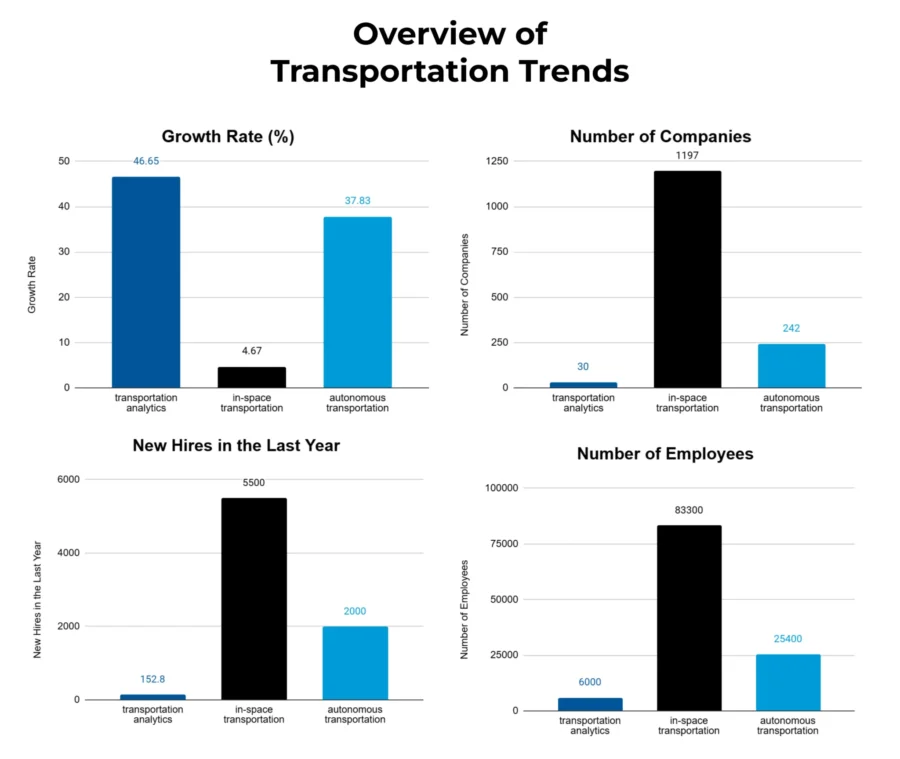The Transportation Industry Outlook for 2025 examines a sector that is witnessing innovation, sustainability, and changing customer needs. In order to tackle issues like urban congestion and decarbonization, the sector is reinventing conventional models with developments in autonomous vehicles, electric mobility, and logistics technology.
This report provides a concise analysis of key trends, growth drivers, and emerging opportunities, which offers valuable insights for professionals, investors, and policymakers shaping the future of global transportation.
Executive Summary: Transportation Outlook 2025
- Industry Growth Overview: The industry continues to draw investments and promote technological breakthroughs despite its 0.16% yearly growth rate. The global transportation market is estimated to grow at a compound annual growth rate (CAGR) of 8.10% to reach USD 15.90 trillion by 2032.
- Manpower & Employment Growth: The sector has over 22.1 million employees worldwide and gained over 917 700 new employees in the past year.
- Patents & Grants: Supported by more than 310 070 applicants worldwide, the sector has more than 1 605 580 patents and 13 930 grants. China and the United States dominate the world in patent filings, accounting for 35 650+ and 342 900+ patents, respectively, with an annual patent growth rate of 0.78%.
- Global Footprint: Leading country hubs include the United States, Germany, the United Kingdom, India, and France, while top city hubs such as London, New York City, Sydney, Melbourne, and Dubai drive innovation and business activity in the sector.
- Investment Landscape: The transportation sector features a strong investment ecosystem with an average funding round value of USD 65.4 million. Over 45 420 funding rounds have been closed, with 26 600+ investors supporting 15 600+ startups worldwide.
- Top Investors: Key investors, including EnCap Flatrock Midstream, SoftBank, European Investment Bank, Tencent, and more, are collectively investing over USD 34 billion in the sector.
- Startup Ecosystem: Innovative startups like Bambi NEMT (non-emergency medical transportation), SWAN INNOVATIONS (car-sharing platform), Ravity (connected vehicle data), eBee.africa (electric bicycles) and Arxax (autonomous green refueling and recharging) represent emerging solutions in the transportation sector.
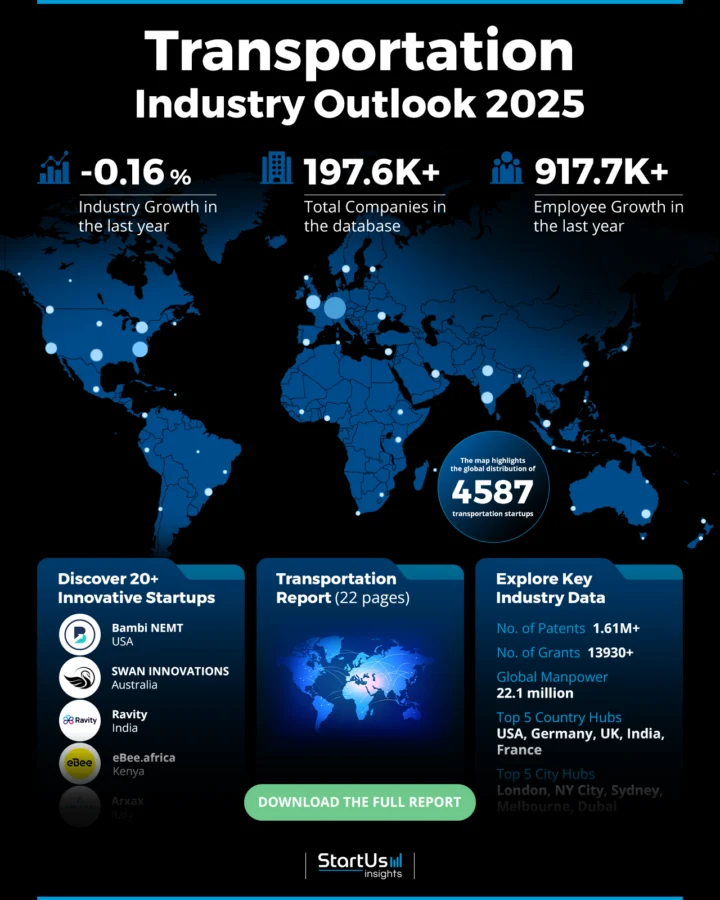
Methodology: How We Created This Transportation Report
This report is based on proprietary data from our AI-powered StartUs Insights Discovery Platform, which tracks 25 million global companies, 20K+ technologies and trends, as well as 150M patents, news articles, and market reports. This data includes detailed firmographic insights into approximately 5 million startups, scaleups, and tech companies. Leveraging this exhaustive database, we provide actionable insights for startup scouting, trend discovery, and technology landscaping.
For this report, we focused on the evolution of transportation over the past 5 years, utilizing our platform’s trend intelligence feature. Key data points analyzed include:
- Total Companies working in the sector
- News Coverage and Annual Growth
- Market Maturity and Patents
- Global Search Volume & Growth
- Funding Activity and Top Countries
- Subtrends within the transportation sector
Our data is refreshed regularly, enabling trend comparisons for deeper insights into their relative impact and importance.
Additionally, we reviewed trusted external resources to supplement our findings with broader market data and predictions, ensuring a reliable and comprehensive overview of the transportation market.
What Data is used to create this Transportation Market Report?
Based on data provided by the StartUs Insights Discovery Platform, we observe that the transportation market stands out in the following categories relative to the 20K+ technologies and trends we track.
These categories provide a comprehensive overview of the market’s key metrics and inform the future direction of the market.
- News Coverage & Publications: The transportation sector received a lot of attention, as seen by the more than 91 900 publications in the previous year.
- Funding Rounds: Our database contains information on over 45 420 funding rounds, indicating that the industry is seeing strong investment activity.
- Manpower: With over 22.1 million employees worldwide, the transportation industry has grown significantly. The sector hired over 917 700 new workers in the last 12 months alone.
- Patents: An extensive 1 605 580+ patents demonstrate the industry’s innovation and substantial R&D efforts.
- Grants: The sector receives assistance for development and innovation projects, as evidenced by 13 930+ grants.
- Yearly Global Search Growth: The industry experienced a 3.14% increase in global search interest, indicating growing attention and curiosity about its developments.
Explore the Data-driven Transportation Market Report for 2025
There are 4500+ startups and 197 600+ companies in the transportation sector. The domain added over 917 700 new workers last year, despite a slight -0.16% growth rate.
According to Data M Intelligence, the global transportation industry market is expected to reach USD 11.1 trillion by 2030, growing with a CAGR of 5.4% during the forecast period 2024-2031.
With 1 605 580+ patents and 13 930+ grants highlighting substantial investment in research and development, innovation is still a cornerstone. The sector employs a significant 22.1 million people worldwide, underscoring its vital significance in economic activity.
While London, New York City, Sydney, Melbourne, and Dubai emerge as prominent city hubs supporting innovation and business growth, the United States, Germany, the United Kingdom, India, and France rank as the top countries for research and development.
A Snapshot of the Global Transportation Market
Despite experiencing a marginal annual growth of -0.16 %, the transportation industry is distinguished by its dynamic environment and consistent innovation.
According to The Business Research Company, the transport market size will grow from USD 7522.07 billion in 2025 to USD 9968.7 billion in 2029 at a CAGR of 7.3%.

Credit: The Business Research Company
Indicating a strong entrepreneurial spirit, the sector consists of approximately 4580 startups. Around 4530 startups are still in the early stages of development. Further, the industry has seen over 11 040 mergers and acquisitions (M&A), which indicates a high level of investment activity and consolidation.
With more than 1 605 580 patents filed worldwide by 310 070+ applicants, the sector continues to be known for its growing intellectual property landscape.
The annual patent growth rate of 0.78% highlights ongoing progress despite the economic downturn. Geographically, China is the largest issuer with over 356 650 patents, closely followed by the United States with over 342 900 patents.
Explore the Funding Landscape of the Transportation Industry
The sector draws USD 65.4 million in investments per round. There are 26 600 investors actively taking part in the investment rounds.
Besides, the industry has conducted over 45 420 investment rounds that supported 15 600+ startups, which shows the broad distribution of capital across several transportation verticals.
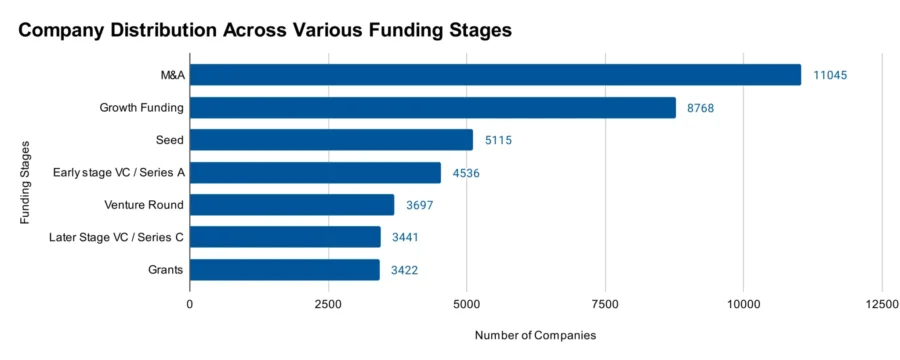
Who is Investing in the Transportation Market?
Leading international investors have made significant investments in the transportation sector, totaling more than USD 34 billion.
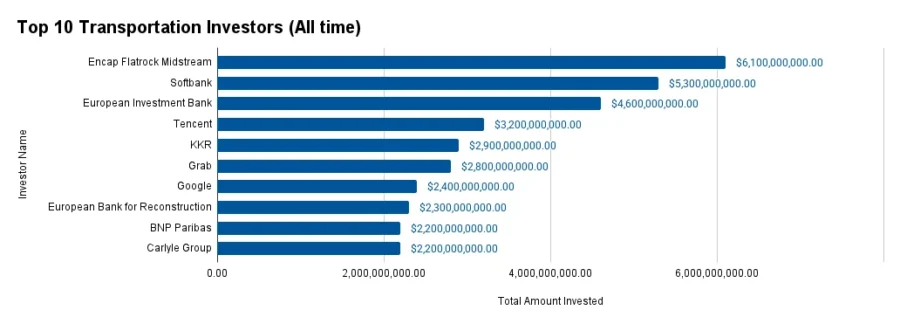
- EnCap Flatrock Midstream invested USD 6.1 billion across 13 companies, focusing on significant growth opportunities. In 2024, EnCap Investments closed its EnCap Energy Capital Fund XII with capital commitments of USD 5.25 billion.
- SoftBank invested USD 5.3 billion in 36 companies, showcasing its commitment to transformative transportation technologies.
- European Investment Bank funded 42 companies with a total investment of USD 4.6 billion. It provided an approx USD 324 million loan for the Bengaluru suburban railway
- Tencent contributed USD 3.2 billion to 21 companies.
- KKR invested USD 2.9 billion across 26 companies. The firm, along with the Ontario Teachers’ Pension Plan (Ontario Teachers’), has committed a total of approximately USD 660 million in the Highways Infrastructure Trust (HIT).
- Grab invested USD 2.8 billion in 3 companies.
- Google allocated USD 2.4 billion to 21 companies.
- European Bank for Reconstruction and Development contributed USD 2.3 billion to 23 companies. In 2024, the EBRD committed up to USD 80 million to the RMBV North Africa Fund III.
- BNP Paribas invested USD 2.2 billion across 33 companies, demonstrating its strategic commitment to transportation financing. It invested around USD 230 million in Shift4Good, along with various other investors, to drive sustainable transport solutions.
- Carlyle Group funded 22 companies with USD 2.2 billion.
Top Transportation Innovations & Trends
Discover the emerging trends in the transportation market along with their firmographic details:
- Transportation Analytics: Using data-driven insights to maximize operations and efficiency, transportation analytics is becoming a key trend. More than 6000 employees are employed by the segment’s 30+ startups, and more than 150 new employees have been added in the last 12 months. In order to solve complicated transportation problems and enhance decision-making, this sector is increasingly dependent on analytics, as seen by its annual trend growth rate of 46.65%.
Precedence Research reports that the global transportation analytics market size is predicted to surpass USD 94.21 billion by 2034, representing a CAGR of 21.6% between 2024 and 2034.
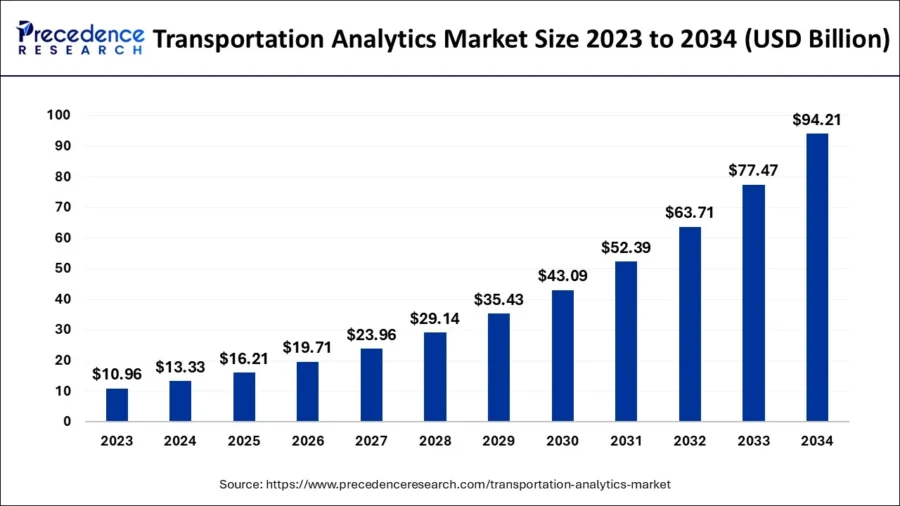
Credit: Precedence Research
- In-Space Transportation: The in-space transportation sector comprises 1190+ startups with 83 300+ employees, including 5500+ new hires in the past 12 months. Steady progress in this industry is demonstrated by an annual trend growth rate of 4.67%.
As per Allied Market Research, the global space transportation market size is projected to reach USD 2.7 billion by 2033, growing at a CAGR of 11.9% from 2024 to 2033.
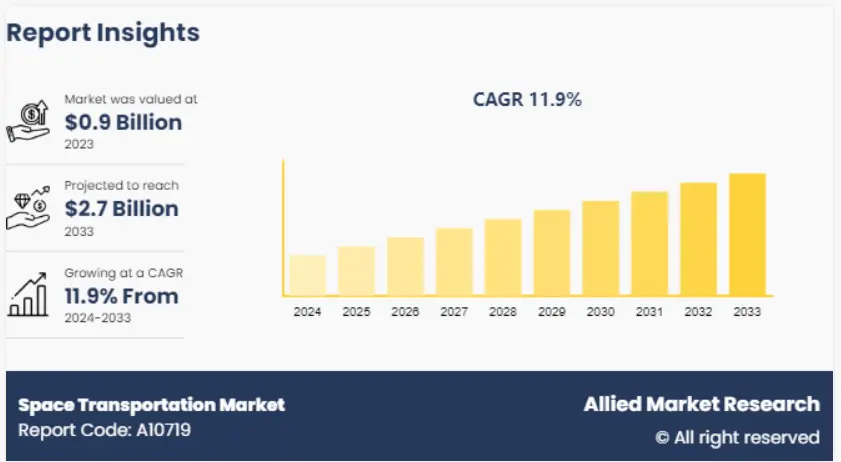
Credit: Allied Market Research
- Autonomous Transportation: With self-driving technologies, autonomous transportation is still transforming mobility. There are 240+ startups in this segment, with 25 400+ employees and 2000+ new hires in the last 12 months. The trend’s annual growth rate of 37.83% indicates how quickly it is developing and how widely several industries, including public transportation, logistics, and passenger cars, are adopting it.
According to Oliver Wyman, autonomous vehicles will make up 20 percent of the total vehicle market by 2030.
5 Top Examples from 4500+ Innovative Transportation Startups
The five innovative startups showcased below are picked based on data including the trend they operate within and their relevance, founding year, funding status, and more. Book a demo to find promising startups, emerging trends, or industry data specific to your company’s needs and objectives.
Bambi NEMT offers Non-emergency Medical Transportation
US-based startup Bambi NEMT offers AI-optimised, customized, non-emergency medical transportation services that ensure dependable and secure mobility for those with medical needs. The startup’s network of drivers and medical-grade cars serves patients with transportation to and from medical facilities, such as hospitals, clinics, and rehabilitation centers.
Its platform streamlines the booking process while providing real-time tracking and updates to ensure transparency and consumer comfort. Bambi NEMT also accommodates people with different mobility needs with its cars by offering outfits for wheelchairs and other assistive technology.
SWAN INNOVATIONS provides a Car-sharing Platform
Australian startup SWAN INNOVATIONS has developed a car-sharing platform that integrates electric vehicle (EV) rentals with a virtual energy grid to support sustainable transportation. It enables users to book, unlock, and drive EVs through a digital interface.
It also simultaneously allows these vehicles to contribute stored energy back to the grid using vehicle-to-grid (V2G) technology. The platform enhances grid stability and promotes community-driven renewable energy utilization by combining mobility and energy trade.
The startup reduces reliance on traditional fuel-based transportation while providing users with cost-effective, eco-friendly mobility solutions.
Ravity enables Connected Vehicle Data
Indian startup Ravity enables businesses and car owners to access and utilize real-time automotive insights with its connected vehicle data platform. The platform provides comprehensive information on performance metrics, fuel efficiency, diagnostics, and predictive maintenance by immediately gathering, processing, and analyzing data from car systems.
It offers a consolidated dashboard for tracking the operating and health conditions of vehicles and connects easily with current fleet management applications. It is beneficial for fleet managers and other automotive stakeholders due to features like route optimization, configurable alarms, and safety analytics.
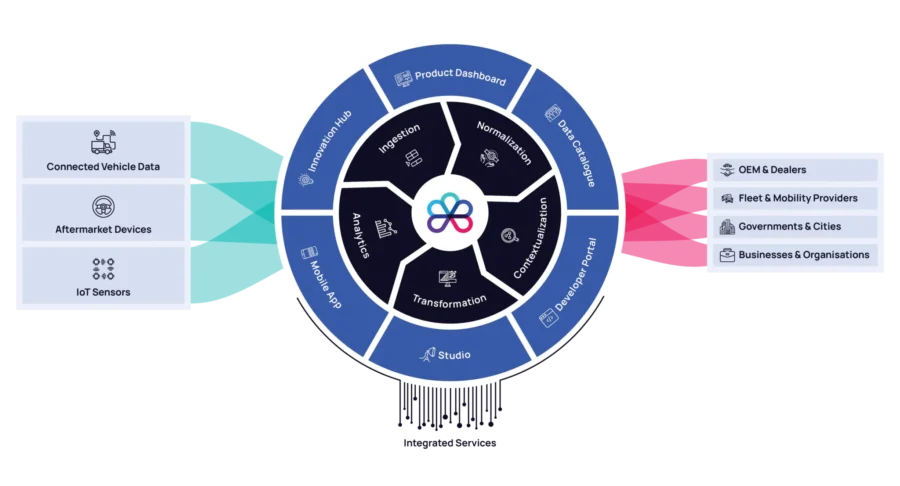
eBee.africa offers Electric Bicycles
Kenya-based startup eBee.africa manufactures and distributes electric bicycles customised for cities and rural areas. These e-bikes are ideal for daily commuting and longer trips. The startup uses lightweight, sturdy materials for their construction and powers them with long-lasting batteries.
eBee.africa integrates regenerative braking and real-time energy monitoring into its bicycles, which enables consumers to measure performance and optimize battery efficiency. The startup addresses issues like growing fuel prices and a lack of public transportation options by offering a cost-effective and environmentally sustainable mobility choice.
Besides,iIt cuts carbon emissions and encourages environmentally friendly transportation, which supports both global environmental objectives.
Arxax enables Autonomous Green Refueling & Recharging
Italian startup Arxax creates autonomous green refueling and recharging systems that facilitate smooth energy delivery for electric and hydrogen-powered vehicles. Its stations automate the refueling and recharging process by combining AI, sensors, and robotics to reduce human intervention and increase efficiency.
It decreases carbon emissions and ensures sustainable operations with renewable energy-fueled systems. Arxax’s technology accommodates a broad variety of vehicle types, from private automobiles to business fleets.
The startup accelerates the adoption of electric and hydrogen vehicles by addressing clean energy distribution and infrastructure development issues.
Gain Comprehensive Insights into Transportation Trends, Startups, and Technologies
The 2025 transportation industry is evolving rapidly, driven by innovation in autonomous vehicles, green energy, and connected mobility. The industry exhibits resilience and potential with rising investments, patent activity, and employee growth.
Get in touch to explore 197 600+ startups and scaleups, as well as all market trends impacting transportation companies.



